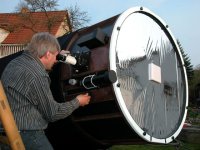Soldato
The nights are getting longer. Jupiter's coming out to play. Hell, soon we might even see Orion pop his head over the horizon. What better time to create a long overdue Astronomy thread? I know there's quite a few of us on here, ranging from full time imagers (if any of you would be kind enough to donate something to the OP i'm sure it would be much appreciated  ) to naked eye observers (like me). So stop hiding away, show off your gear and find yet another place to whine about these cloudy nights
) to naked eye observers (like me). So stop hiding away, show off your gear and find yet another place to whine about these cloudy nights 
We can also use this thread to keep up to date on all the latest Physics (and, yes... i suppose other Sciences ) news and help out prospective astronomers. And feel free to suggest anything to go in this post to make it more helpful/just generally better.
) news and help out prospective astronomers. And feel free to suggest anything to go in this post to make it more helpful/just generally better.
Clear skies!
Helpful links:
http://www.stellarium.org/ - Essential Open Source software for any budding astronomer
http://www.wwnorton.com/college/astronomy/astro21/sandt/startright.html - Great reading material for beginners
http://stargazerslounge.com/ - Arguably the best dedicated Astronomy forum out there
 ) to naked eye observers (like me). So stop hiding away, show off your gear and find yet another place to whine about these cloudy nights
) to naked eye observers (like me). So stop hiding away, show off your gear and find yet another place to whine about these cloudy nights 
We can also use this thread to keep up to date on all the latest Physics (and, yes... i suppose other Sciences
 ) news and help out prospective astronomers. And feel free to suggest anything to go in this post to make it more helpful/just generally better.
) news and help out prospective astronomers. And feel free to suggest anything to go in this post to make it more helpful/just generally better.Clear skies!

Helpful links:
http://www.stellarium.org/ - Essential Open Source software for any budding astronomer
http://www.wwnorton.com/college/astronomy/astro21/sandt/startright.html - Great reading material for beginners
http://stargazerslounge.com/ - Arguably the best dedicated Astronomy forum out there




